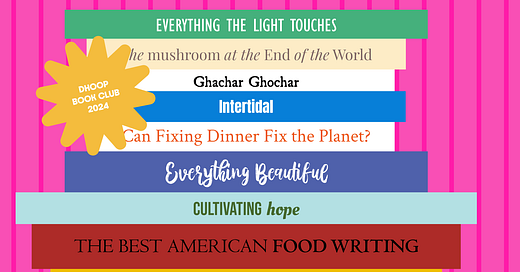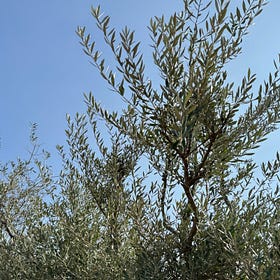A year of books, conversations and occupying space
Reading and sharing more in 2025 + Issue #3 pitch call to open soooooon!
2024 marks the third year of independently navigating the food media/climate communication landscape. I use “food media” with some hesitation because we are a misfit in that space. Even when I started dhoop, I never viewed food as an isolated entity, and this perspective has only grown stronger over the past few months.
This way of thinking—of using food as a lens to understand the world—is far from new. If you use food as a lens to view the world, you’ll see how it dictates the way the world has evolved. From traversing multiple landscapes, negotiating for spices from faraway lands, to planting an alien seed in a new environment — only to have it deeply entrenched in the cuisine of a new country, to divide, to conquer, and to celebrate — food has been the main character for a long time. As a publication, documenting food narratives naturally involves delving into the intertwined realms of nature, culture, sustainability, and design. Through these intersections, we continue to uncover stories that challenge, expand, and redefine our understanding of food and its profound impact on the world.
When Dhoop started taking a physical form as a zine at the RISD Unbound, I didn’t imagine that it would become a magazine with stories from people equally interested in the ideas of using food as a worldview. We started with Issue #1 in 2022 (Sunlight & Food), then explored Commensality & Food through Issue #2. We managed to get over 70 people to pitch and sold a few hundred copies across India and the US (yay!). In 2024, we started a book club and read almost one book every month, wrote here ‘Some dhoop for you’ as consistently as we could, interviewed people in our community who don’t directly work in food, but their work influences food, culture, and eating in many ways with ‘Adjacent’ and started working on Issue #3 (more on it soon).
I read and wrote more than usual this year. Here are a few of them I still think about:
Food cannot cure all the world’s ails, but it’s a start. If we can share a meal, maybe we can share a conversation too.
— René Redzepi, You and I Eat the Same
It is hopeful to imagine that sharing a meal could be a start to having a conversation. But, depending on one’s context, this statement may or may not be true. Food can compel commensalism and conversation, but, “There is no guarantee that eating another’s food makes us more tolerant towards him.’’1
We Eat
On Jan 28, during a rather slow Sunday evening we spoke about the contents of the book You and I Eat the Same: On the Countless Ways Food and Cooking Connects Us to One Another. This anthology of essays by some well-known names in the food industry was a part of dhoop’s book club. As the title suggests, the book is meant to elaborate on the sameness in …
There is no dearth of recipes on the internet. The fast, smooth cuts in videos make the process of cooking look seamless, as if one doesn’t need to prep or clean up afterward. However, these small blobs on the internet extend one's imagination, open up the possibility of unlearning and learning, and maybe even inspire you to go to the kitchen and cook.
I wrote this last winter, and it still is true. For 2025, we went overboard with the cooking advice and made a calendar with Keertida that tells you the month/day/date and nudges you to cook two seasonal recipes.
Pretty cool, right?2
Every month for 12 months
December is the month of reflection, sometimes intentional often forced. As we move into what has been a monumental year for so many reasons, we are compelled to look back before we look forward. In the coming month, we want to address a few things, and tell you what the next steps for dhoop look like ( Hint: Get ready to pitch for Issue #3). But before…
It was unfamiliar, strange and breathtaking. I left empty-handed.
I visited the Rajasthan Olive Cultivation Ltd. at Bassi in Dec 2023 and stood in the middle of a 2 acre land of olive trees all around me. To experience an olive plantation in my hometown was surprisingly surreal.3
🫒Olives in Rajasthan
Imagine standing on a vast stretch of land lined with thin silvery-green leafed trees swaying in the warm air of the desert. The fruit feels familiar, a green globose berry– is it karonda? You pluck this mysterious yet familiar fruit and bravely bite into it. Shockingly bitter, almost unidentifiable, this is an olive – far away from the land of gelato, …
Life & Thyme will always remain an “idea”, never a destination or a finished product. It is an idea that represents creative freedom. It is an idea that adapts to the world we find ourselves in. It is an idea that represents food, art, culture, and community—pillars in life that are never stagnant. The day that L&T feels stagnant is the day I close its doors
— Antonio Diaz, Life & Thyme
What Antonio Diaz said is so true for the work we do and want to continue doing. “Life & Thyme Post, our printed newspaper, is coming to an end,” he wrote. The reasons, mentioned in full transparency, gave us a reality check. Print is expensive, the cost of shipping is unsustainable, and the pace of creating a physical copy of a magazine/newspaper cannot ever be super fast. But Diaz’s words left us with so much hope and an undying relentlessness that comes with it. If you were to take back anything, take the idea of doing something you truly believe in and see where it ends up and where it takes you.
Elite are resource illiterate…The fact is that elite determine food culture. And it is important therefore for making sure that all your restaurants that serve people when you put that food that forgotten food..that link with biodiversity, when you put it in your blog, when you talk about it..it helps people to understand, that culture of food will change.
— Sunita Narain, Future of Taste
Narain’s words have stayed with me because they reflect a specific dilemma attached to food production ( growing more millets now that the rich wants to include it in their diets), communication/food writing, and the luxury attached to specific food experiences. It also showcases that catering to the elite has a larger trickle down effect in society.
2024 was all about taking small steps and figuring out our way as an independent magazine. We won’t be able to continue hosting the book club this year on our own, but if any bookstores or community-driven brands are looking for partners, please reach out to us.
This year, we are working towards creating more. Issue #3 is right around the corner, and we ( a small two-person team) can use your support. If you like what we do, share our magazine with people. We want the magazines to find more homes.
If you want to support our work beyond the magazine, please consider becoming a paid subscriber. Your contributions will help us keep dhoop going for longer. As a paid subscriber, you will be the first to know all about ISSUE #3 theme, get recommended readings, events info, merch drops ( yes, totes are coming back!! ) and get a full preview of past issues.
Food is a portal to understanding our world, our communities and ourselves. It provides a unique and critical perspective on everything—from everyday habits to global issues, from the way we design our countries, cities to how we navigate climate crises.
dhoop uses food as a lens. Through this lens, we can interrogate culture, sustainability, design and the systems that sustain life. Initially, we started as a magazine focused on stories of food and its intersections. Over time, it has grown into something more profound—a space, a research platform, embracing a multidisciplinary approach that invites collaboration and deeper inquiry.
Krishnendu Ray’s Culinary Difference Makes a Difference
The 2025 calendar is put together by dhoop in collaboration with Chef Keertida Phadke. It has illustrations, affirmations on the front and two seasonal recipes as you flip the pages of each month. Will it remind you to cook something different and seasonal? That’s our hope.









